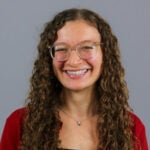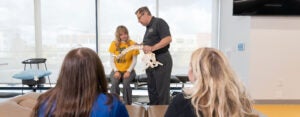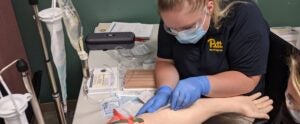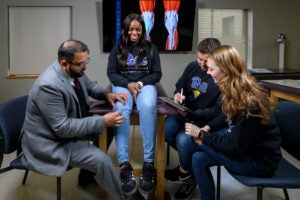The Rehabilitation Science program includes a variety of curriculum topics to help any student reach their health career goals. These include:
- Disability and health care issues
- Global citizenship
- Human sciences (anatomy, physiology, kinesiology)
- Research methods
Students complete the required coursework during their junior and senior years. While enrolled in the Rehabilitation Science program, they must complete a minimum of 30 credits of SHRS coursework, including the core courses and at least one course from each of the core areas. Students must complete 120 cumulative credits to graduate with the BS in Rehabilitation Science degree.
The 30 required SHRS credits include courses from the following programs: ATHLTR, CSD, EM, HIM, HRS, NUTR, REHSCI.
Core Course Requirements
- REHSCI 1200 – Human Anatomy
- REHSCI 1201 – Human Anatomy Lab
- REHSCI 1225 – Intro to Rehabilitation Science
- REHSCI 1235 – Medical Terminology
- REHSCI 1240 – Issues in Health Care
- REHSCI 1265 – Pharmacology in Rehabilitation
- REHSCI 1280 – Psychology and sociology of Disability
Core Areas
Human Development (3 credits)
Students must complete one of the following:
- REHSCI 1245 – Human Development – Preferred
- HHD 0005 – Life Span Development or
- PSY 0310 – Developmental Psychology – Accepted
Human Physiology (4 credits):
Students must complete one of the following:
- REHSCI 1205 – Human Physiology
- BIOSC 1070 – Human Physiology – UHC
- BIOSC 1250 – Human Physiology or
- NROSCI 1250 – Human Physiology and
- BIOSC 1255 – Physiology Lab
- NOTE: This class is reserved for biology majors. Rehabilitation Science students can register only if seats are available after biology students have enrolled.
- REHSCI 1206 – Human Physiology Lab
- NROSCI 1070 – Human Physiology – UHC
- Another approved course
Neuroscience:
Students must take one of the following:
- REHSCI 1210 – Neuroscience
- NROSCI 0080 – Brain and Behavior
- NROSCI 0083 – UHC Brain and Behavior
- NROSCI 1000 – Intro to Neuroscience
- NROSCI 1003 – UHC Introduction to Neuroscience
- PSY 0505 – Introduction to Biopsychology
Research Methodology:
Students must take one of the following:
- REHSCI 1000 – Principles of Research Methodology – Strongly recommended
- PSY 0036 – Research Methods Lecture
- PUBHLT 0431 – Understanding and Interpreting Health Research
Global Citizenship:
Students must take one of the following:
- ANTH 1761 – Patients and Healers: Medical Anthropology 1
- HIST 1090 – History Medicine and Health Care
- NUR 1829 – Contemporary Issues – Cross-Cultural Health
- PSY 0186 – Cross-Cultural Psychology
- PUBHLT 1001 – Introduction to Global Health
- REHSCI 1292 – Diversity and Cultural Issues in Health, Disability and Rehabilitation
- REHSCI 1297 – Cross-Cultural Independent Study
- SOCWRK 1035 – Global Perspectives Social Work
- SPAN 1323 – Medical Spanish
- A Study/Internship abroad with a health, rehabilitation, or disability component and an academic inquiry into culture may fulfill this requirement. Contact the department for additional details and requirements.
- SOC 0477 – Medical Sociology
Health/Science Writing Intensive:
Students must take one of the following:
- ENGCMP 0430 – Public Communication of Science and Technology
- ENGCMP 0450 – Research Writing
- ENGCMP 0530 – Writing for the Sciences
- ENGCMP 0535 – Writing in Health Science Professions
- ENGCMP 1101 – Language of Science and Technology
- ENGCMP 1102 – Language of Medicine
- ENGCMP 1400 – Grant Writing for Nonprofits
- ENGCMP 1402 – Grant writing for Research
Total Core Requirement Credits: 31-32
Elective Courses
- REHSCI 1206 – Human Physiology Lab
- REHSCI 1219 – Exercise Physiology with Lab
- REHSCI 1220 – Kinesiology and Biomechanics
- REHSCI 1221 – Kinesiology and Biomechanics Lab
- REHSCI 1230 – Rehabilitation Ethics
- REHSCI 1250 – Pathophysiology/Human Disease
- REHSCI 1275 – Intro to Occupation Science
- REHSCI 1285 – Intro to Evidence-Based Rehabilitation
- REHSCI 1290 – Practical Issues in Disability
- REHSCI 1295 – Field Experience
- REHSCI 1296 – Assistive Technology in Rehabilitation Field Experience
- REHSCI 1299 – Independent Study
- HRS 1787 – Introduction to Orthotics and Prosthetics
- REHSCI 1211 – Fundamentals of Rehabilitation and Assistive Technology Applications
- REHSCI 1320 – Applied Anatomy and Kinesiology
- REHSCI 1222 – Clinical Health Assessment
- RT 1102 – Fundamentals of Rehabilitation and Assistive Technology Design
- RT 1207 – Client-Centered Rehabilitation and Assistive Technology Design
- PO 1101 – Precertification Orthotic Fitter
Coming soon: COUN 1733 – Counseling Skills for Healing Professions
Example Plan of Study
This plan of study example includes both required and elective courses offered in the Undergraduate Program in Rehabilitation Science. Students are encouraged to design their own plan of study based on their career, academic and personal interests.
Junior Year-Fall Term – Credits: 16
The first five courses listed below are REQUIRED to be completed in this first fall term.
- REHSCI 1200 – Human Anatomy – Required
- REHSCI 1201 – Human Anatomy Lab – Required
- REHSCI 1205 – Human Physiology – Required
- REHSCI 1225 – Intro to Rehabilitation Science – Required
- REHSCI 1240 – Issues in Health Care – Required
- REHSCI 1000 – Principles of Research Methodology
- REHSCI 1235 – Medical Terminology
Junior Year-Spring Term – Credits: 15
- Study Abroad
- -OR-
- REHSCI 1220 – Kinesiology and Biomechanics
- REHSCI 1221 – Kinesiology and Biomechanics Lab
- REHSCI 1265 – Pharmacology in Rehabilitation
- REHSCI 1275 – Intro to Occupation Science
- REHSCI 1292 – Diversity and Cultural Issues in Health, Disability and Rehabilitation
- REHSCI 1295 – Field Experience
Senior Year-Fall Term Credits: 16
- REHSCI 1211 – Fundamentals of Rehabilitation and Assistive Technology Applications
- REHSCI 1210 – Neuroscience
- REHSCI 1219 – Exercise Physiology with Lab
- REHSCI 1230 – Rehabilitation Ethics
- REHSCI 1285 – Intro to Evidenced-Based Rehabilitation
Senior Year-Spring Term Credits: 16
- REHSCI 1245 – Human Development
- REHSCI 1250 – Pathophysiology/Human Disease
- REHSCI 1280 – Psychology and Sociology of Disability
- REHSCI 1290 – Practical Issues in Disability
- Health/Science Writing Intensive




